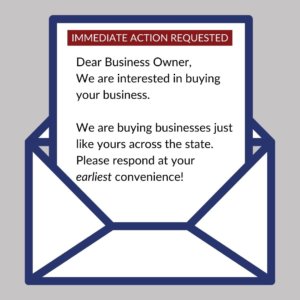
Numerous clients have shared recently that they are seeing an increase in unsolicited inquiries about purchasing their business, some of which are legitimate inquiries from buyers or business brokers. While it is natural to be excited that you are a ‘target’ for an interested buyer, it is critical to slow down, stay calm and respond, not react. From your very first communication, you are setting the tone for the negotiation. The psychology of the deal will matter just as much as the financial value you are looking to receive.
While we can provide the answer to “what is the value of my business?” the ultimate deal will very likely transact at a different price. That’s because in every transaction, one of the parties is more motivated--real or perceived--to complete the transaction. An anxious, excited seller forfeits the opportunity to recognize the highest price.
We like to say that there is a difference between a potential buyer reaching out and you reacting versus a potential buyer reaching out and you being ready to respond to have the right conversation.
Here’s a real life example. Before we met her, one of our clients was surprised about being contacted by a potential buyer. She had been thinking about retirement and here was a letter saying someone wanted to buy her business. However, in her rush to respond and get out of the owner's seat, she also gave up her place in the driver’s seat by willingly providing financial and other critical information about her business during this important step of her exit. She gave up too much information about her business too early because although well intentioned, she was reacting rather than responding.
This owner is not alone. When you're prepared, you drive the conversation and timeline. You realize that obtaining information from the buyer to qualify them as a capable buyer is just as important as you sharing your business information. In our client’s example, she also had no idea what the value of her business was--when asked, she was caught unaware.
The psychology of the deal was set--the buyer knows the seller is in a hurry, is unprepared and will take full advantage of that in negotiating their position. The rest unraveled from there and the deal fell apart leaving a competitor with key insights into her business.
So how do you prepare (at any age or stage of ownership) to be a sophisticated, prepared seller? What does it mean to respond, not react? Here are three key tips if someone reaches out to buy your business so you can respond, not react.
1. Stay calm and remember the psychology of a deal.
First things first, don’t respond emotionally. Get yourself organized and while you don’t want to wait too long for an initial response, do not rush. Even though you can suddenly see yourself on the cover of Inc. Magazine completing the great business transaction, if you look desperate or react before you’re organized, it will more than likely result in a lower negotiated price. Remember that price is not the same as value. Value is the starting point for negotiations, but the price increases or decreases based on a variety of factors. If the seller sees you are in a hurry, you’re burned out, or not well organized, expect a lower price.
How you act in response to an inquiry as well as how organized you are sends immediate signals to your potential buyer. In an effort to be a good “prospect” we have seen business owners turn over far too much detail before the buyer is even qualified. The buyer might be a competitor or someone in your business community and if the deal doesn’t go through, you’ve opened the door too far, too fast. You’ve reacted, not responded
2. Do not hand over business documents & information about your business too early without qualifying the buyer first.
It may come as a surprise, but if a potential buyer requests 5 years of financial statements or tax returns, you can ask that you be provided with their financial statements or tax returns. What?! Yes, it is perfectly reasonable for you to respond letting them know you’re interested in a discussion, but you also need to qualify them as a capable buyer. Then, if the deal does not go through, you at least have the same business information from the buyer as they have on your business, keeping negotiations and the dynamics of the conversation as balanced as possible.
Other subjects you can discuss to qualify a buyer beyond sharing financials include non-negotiables for a potential deal. For example, you may want to clarify the buyer’s intent for keeping your business in the community with the same locations open, maintaining your company’s name, or keeping your employees.
3. Enter the discussion having an understanding of the value of your business to you if you do not sell the business.
You won’t get very far into the discussion without expectations of value being discussed. Recall value is forward looking and measures your company’s future earning capacity. At a minimum, you want to be able to say “I am having a business valuation completed and it will take several weeks.” This demonstrates to the buyer that you are not in a hurry, you are organized, sophisticated and not in a hurry.
This approach encourages ongoing dialogue with the interested buyer, but always staying cognizant of the fact that value and price can be quite different, depending upon how you respond to the inquiry. Price is negotiated and whether the buyer or the seller has the momentum in this negotiation can significantly impact the actual transaction price. Value is the starting point based on the value to YOU, and price is based on the negotiation process.
Knowing the supportable, realistic value of your business to you if you don’t sell is really the starting point.
While some business owners wait until a buyer comes knocking, others are proactive and recognize that having a baseline understanding of the value of their business not only prepares them to respond to a potential buyer if it’s the right deal, but also helps them understand the drivers of value that can help increase value over time. There’s power in being ready to respond when a potential buyer comes knocking.
For 47 years we have been a sounding board for business owners when they “don’t know where to begin or what to do next.” It all starts with a complimentary phone call to help business owners figure out the best next steps. Set up a call here.

Cathy is the President of Capital Valuation Group, Inc., headquartered in Madison, WI. Capital Valuation Group has been helping business owners across the country understand, increase and unlock the value of their businesses for over 40 years through keynote speaking, valuation analysis, determining damages and providing expert witness testimony. Cathy welcomes conference and event speaking inquiries and can be reached at cdurham@capvalgroup.com.
